University Academic Integrity Report: Game Development Reflection
VerifiedAdded on 2022/12/16
|8
|2475
|349
Report
AI Summary
This report, prepared by a student for the BMP3003 Further Academic Skills module, delves into the concept of academic integrity, defining it as the adherence to honest and fair practices in academic work. It emphasizes the importance of integrity in higher education, highlighting its role in fostering true understanding, skill development, and moral responsibility. The report explores the implications of academic misconduct, including social and legal consequences, loss of intellectual property, and damage to self-esteem. Section 2 provides a detailed reflection on the game development project, discussing the steps taken, technical and financial difficulties encountered, and the skills acquired, such as decision-making, communication, and technical proficiency. The report concludes by reiterating the significance of academic integrity for personal and professional success, referencing several academic sources to support the analysis.
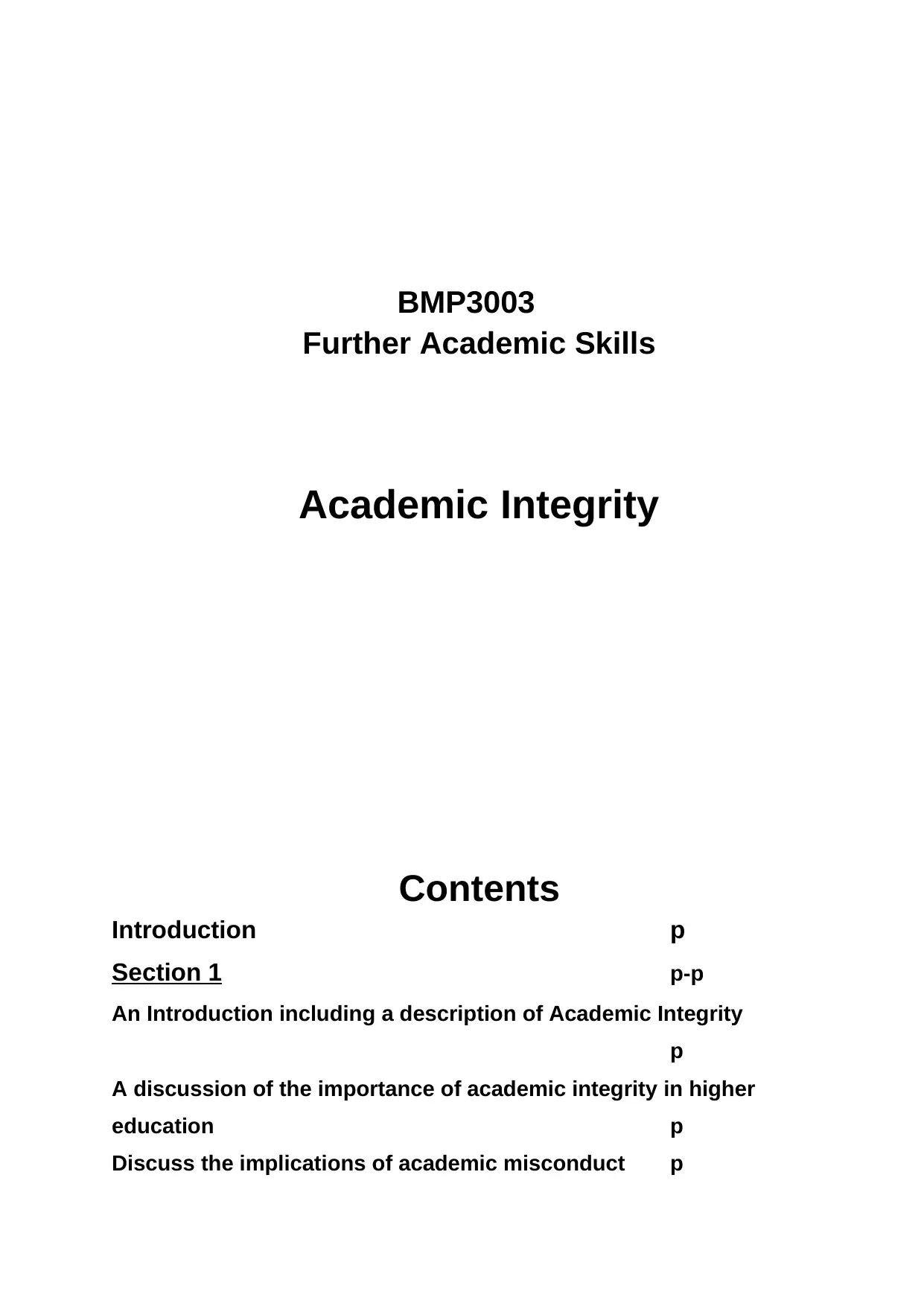
BMP3003
Further Academic Skills
Academic Integrity
Contents
Introduction p
Section 1 p-p
An Introduction including a description of Academic Integrity
p
A discussion of the importance of academic integrity in higher
education p
Discuss the implications of academic misconduct p
Further Academic Skills
Academic Integrity
Contents
Introduction p
Section 1 p-p
An Introduction including a description of Academic Integrity
p
A discussion of the importance of academic integrity in higher
education p
Discuss the implications of academic misconduct p
Paraphrase This Document
Need a fresh take? Get an instant paraphrase of this document with our AI Paraphraser
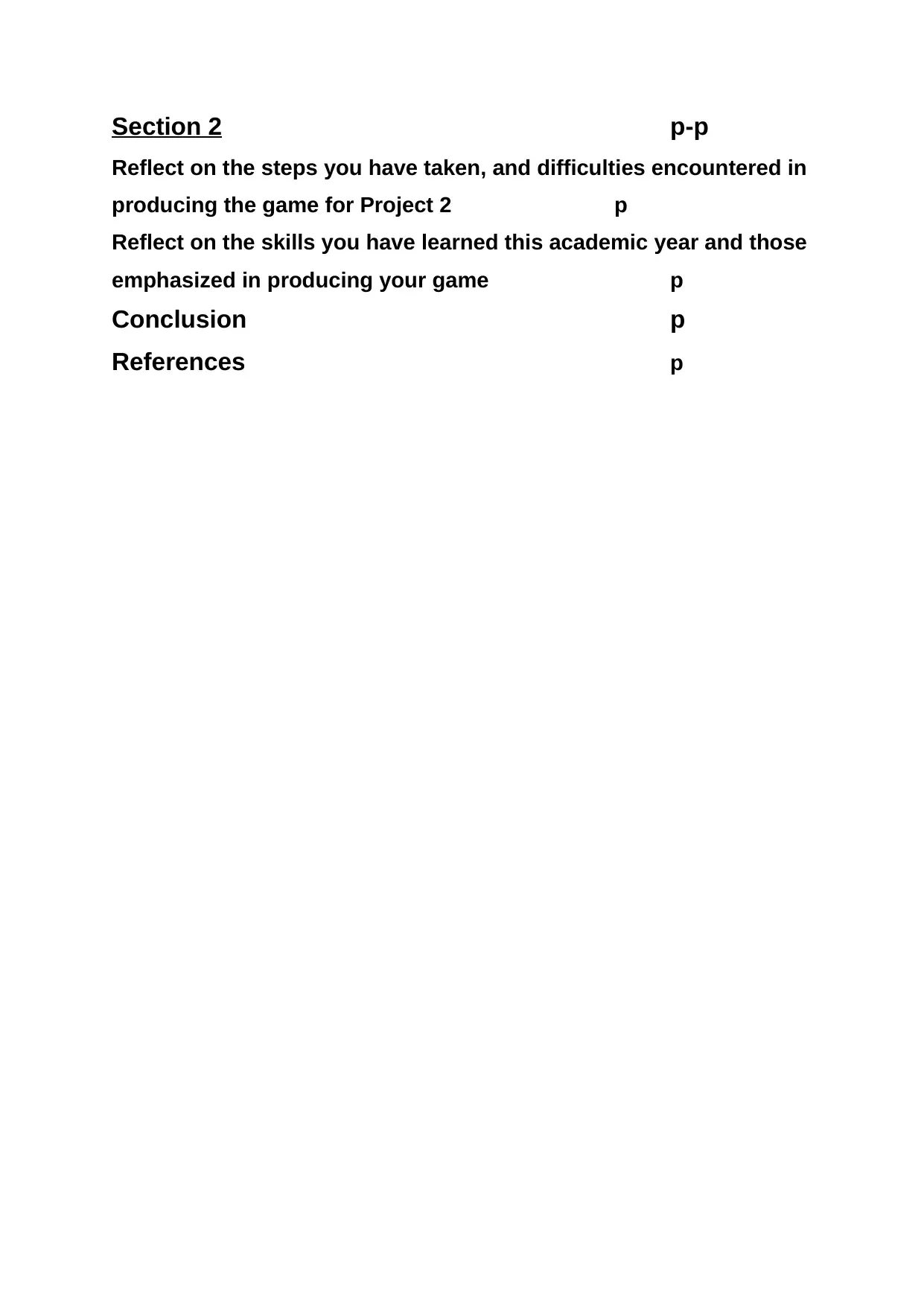
Section 2 p-p
Reflect on the steps you have taken, and difficulties encountered in
producing the game for Project 2 p
Reflect on the skills you have learned this academic year and those
emphasized in producing your game p
Conclusion p
References p
Reflect on the steps you have taken, and difficulties encountered in
producing the game for Project 2 p
Reflect on the skills you have learned this academic year and those
emphasized in producing your game p
Conclusion p
References p
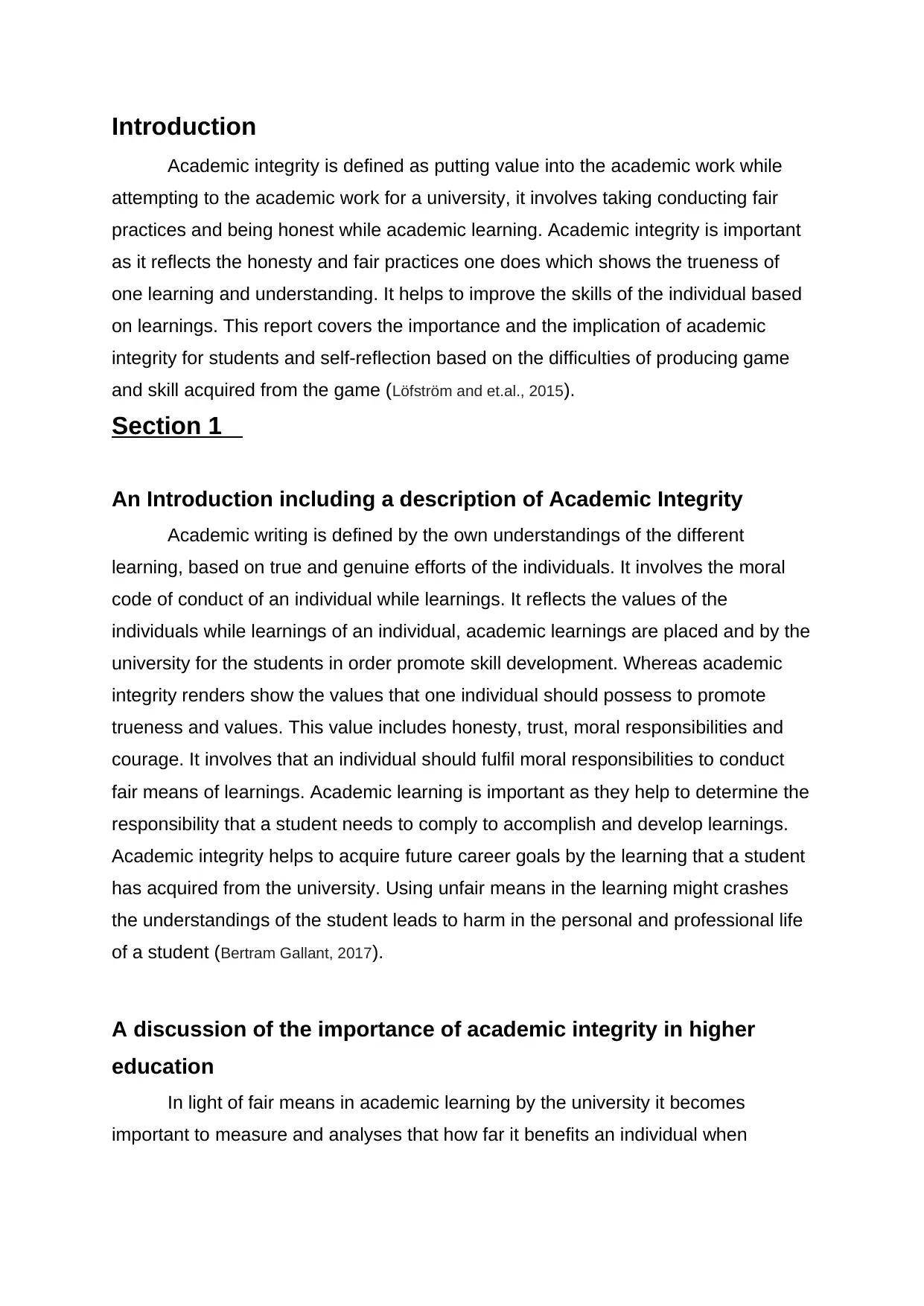
Introduction
Academic integrity is defined as putting value into the academic work while
attempting to the academic work for a university, it involves taking conducting fair
practices and being honest while academic learning. Academic integrity is important
as it reflects the honesty and fair practices one does which shows the trueness of
one learning and understanding. It helps to improve the skills of the individual based
on learnings. This report covers the importance and the implication of academic
integrity for students and self-reflection based on the difficulties of producing game
and skill acquired from the game (Löfström and et.al., 2015).
Section 1
An Introduction including a description of Academic Integrity
Academic writing is defined by the own understandings of the different
learning, based on true and genuine efforts of the individuals. It involves the moral
code of conduct of an individual while learnings. It reflects the values of the
individuals while learnings of an individual, academic learnings are placed and by the
university for the students in order promote skill development. Whereas academic
integrity renders show the values that one individual should possess to promote
trueness and values. This value includes honesty, trust, moral responsibilities and
courage. It involves that an individual should fulfil moral responsibilities to conduct
fair means of learnings. Academic learning is important as they help to determine the
responsibility that a student needs to comply to accomplish and develop learnings.
Academic integrity helps to acquire future career goals by the learning that a student
has acquired from the university. Using unfair means in the learning might crashes
the understandings of the student leads to harm in the personal and professional life
of a student (Bertram Gallant, 2017).
A discussion of the importance of academic integrity in higher
education
In light of fair means in academic learning by the university it becomes
important to measure and analyses that how far it benefits an individual when
Academic integrity is defined as putting value into the academic work while
attempting to the academic work for a university, it involves taking conducting fair
practices and being honest while academic learning. Academic integrity is important
as it reflects the honesty and fair practices one does which shows the trueness of
one learning and understanding. It helps to improve the skills of the individual based
on learnings. This report covers the importance and the implication of academic
integrity for students and self-reflection based on the difficulties of producing game
and skill acquired from the game (Löfström and et.al., 2015).
Section 1
An Introduction including a description of Academic Integrity
Academic writing is defined by the own understandings of the different
learning, based on true and genuine efforts of the individuals. It involves the moral
code of conduct of an individual while learnings. It reflects the values of the
individuals while learnings of an individual, academic learnings are placed and by the
university for the students in order promote skill development. Whereas academic
integrity renders show the values that one individual should possess to promote
trueness and values. This value includes honesty, trust, moral responsibilities and
courage. It involves that an individual should fulfil moral responsibilities to conduct
fair means of learnings. Academic learning is important as they help to determine the
responsibility that a student needs to comply to accomplish and develop learnings.
Academic integrity helps to acquire future career goals by the learning that a student
has acquired from the university. Using unfair means in the learning might crashes
the understandings of the student leads to harm in the personal and professional life
of a student (Bertram Gallant, 2017).
A discussion of the importance of academic integrity in higher
education
In light of fair means in academic learning by the university it becomes
important to measure and analyses that how far it benefits an individual when
⊘ This is a preview!⊘
Do you want full access?
Subscribe today to unlock all pages.

Trusted by 1+ million students worldwide
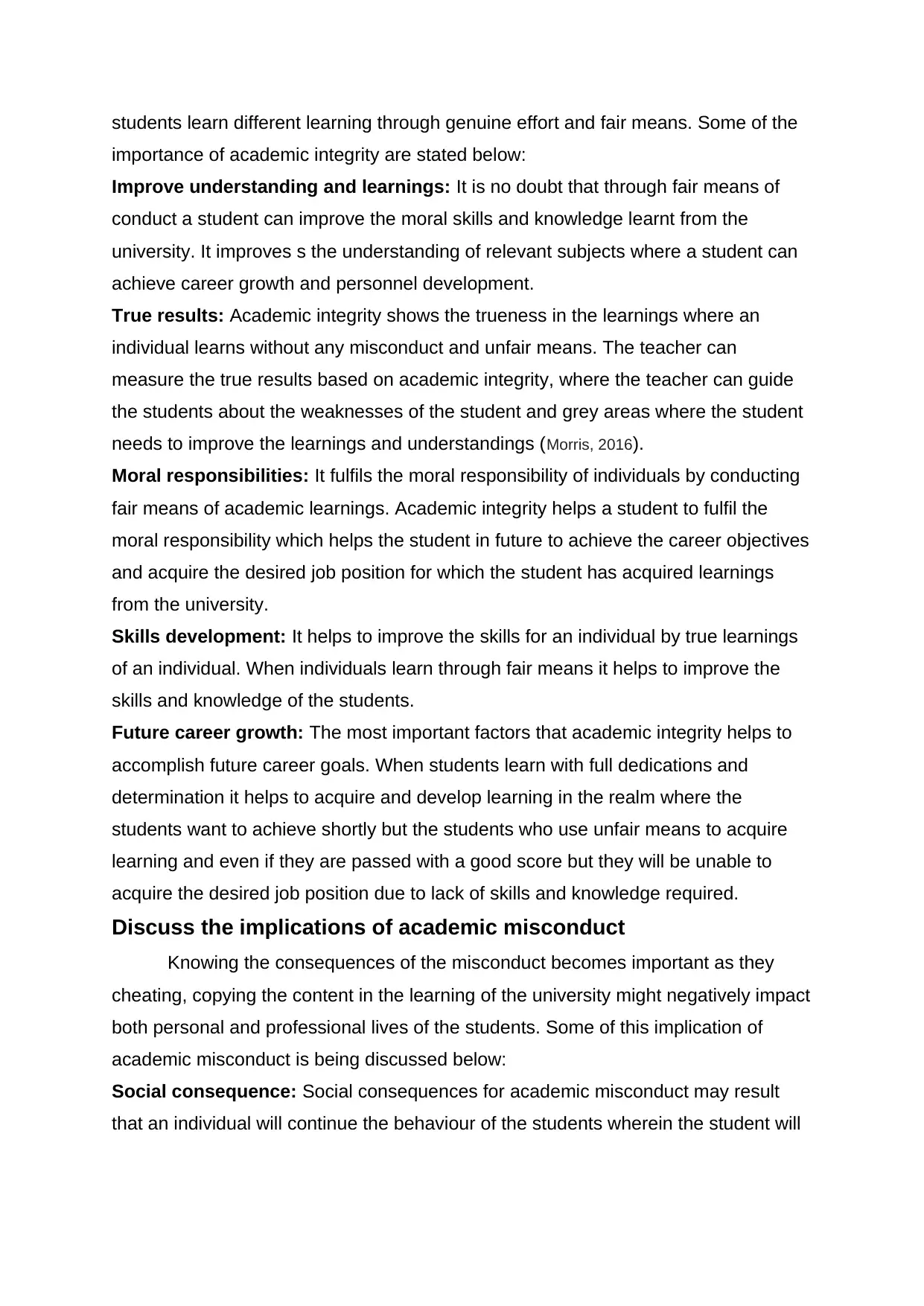
students learn different learning through genuine effort and fair means. Some of the
importance of academic integrity are stated below:
Improve understanding and learnings: It is no doubt that through fair means of
conduct a student can improve the moral skills and knowledge learnt from the
university. It improves s the understanding of relevant subjects where a student can
achieve career growth and personnel development.
True results: Academic integrity shows the trueness in the learnings where an
individual learns without any misconduct and unfair means. The teacher can
measure the true results based on academic integrity, where the teacher can guide
the students about the weaknesses of the student and grey areas where the student
needs to improve the learnings and understandings (Morris, 2016).
Moral responsibilities: It fulfils the moral responsibility of individuals by conducting
fair means of academic learnings. Academic integrity helps a student to fulfil the
moral responsibility which helps the student in future to achieve the career objectives
and acquire the desired job position for which the student has acquired learnings
from the university.
Skills development: It helps to improve the skills for an individual by true learnings
of an individual. When individuals learn through fair means it helps to improve the
skills and knowledge of the students.
Future career growth: The most important factors that academic integrity helps to
accomplish future career goals. When students learn with full dedications and
determination it helps to acquire and develop learning in the realm where the
students want to achieve shortly but the students who use unfair means to acquire
learning and even if they are passed with a good score but they will be unable to
acquire the desired job position due to lack of skills and knowledge required.
Discuss the implications of academic misconduct
Knowing the consequences of the misconduct becomes important as they
cheating, copying the content in the learning of the university might negatively impact
both personal and professional lives of the students. Some of this implication of
academic misconduct is being discussed below:
Social consequence: Social consequences for academic misconduct may result
that an individual will continue the behaviour of the students wherein the student will
importance of academic integrity are stated below:
Improve understanding and learnings: It is no doubt that through fair means of
conduct a student can improve the moral skills and knowledge learnt from the
university. It improves s the understanding of relevant subjects where a student can
achieve career growth and personnel development.
True results: Academic integrity shows the trueness in the learnings where an
individual learns without any misconduct and unfair means. The teacher can
measure the true results based on academic integrity, where the teacher can guide
the students about the weaknesses of the student and grey areas where the student
needs to improve the learnings and understandings (Morris, 2016).
Moral responsibilities: It fulfils the moral responsibility of individuals by conducting
fair means of academic learnings. Academic integrity helps a student to fulfil the
moral responsibility which helps the student in future to achieve the career objectives
and acquire the desired job position for which the student has acquired learnings
from the university.
Skills development: It helps to improve the skills for an individual by true learnings
of an individual. When individuals learn through fair means it helps to improve the
skills and knowledge of the students.
Future career growth: The most important factors that academic integrity helps to
accomplish future career goals. When students learn with full dedications and
determination it helps to acquire and develop learning in the realm where the
students want to achieve shortly but the students who use unfair means to acquire
learning and even if they are passed with a good score but they will be unable to
acquire the desired job position due to lack of skills and knowledge required.
Discuss the implications of academic misconduct
Knowing the consequences of the misconduct becomes important as they
cheating, copying the content in the learning of the university might negatively impact
both personal and professional lives of the students. Some of this implication of
academic misconduct is being discussed below:
Social consequence: Social consequences for academic misconduct may result
that an individual will continue the behaviour of the students wherein the student will
Paraphrase This Document
Need a fresh take? Get an instant paraphrase of this document with our AI Paraphraser
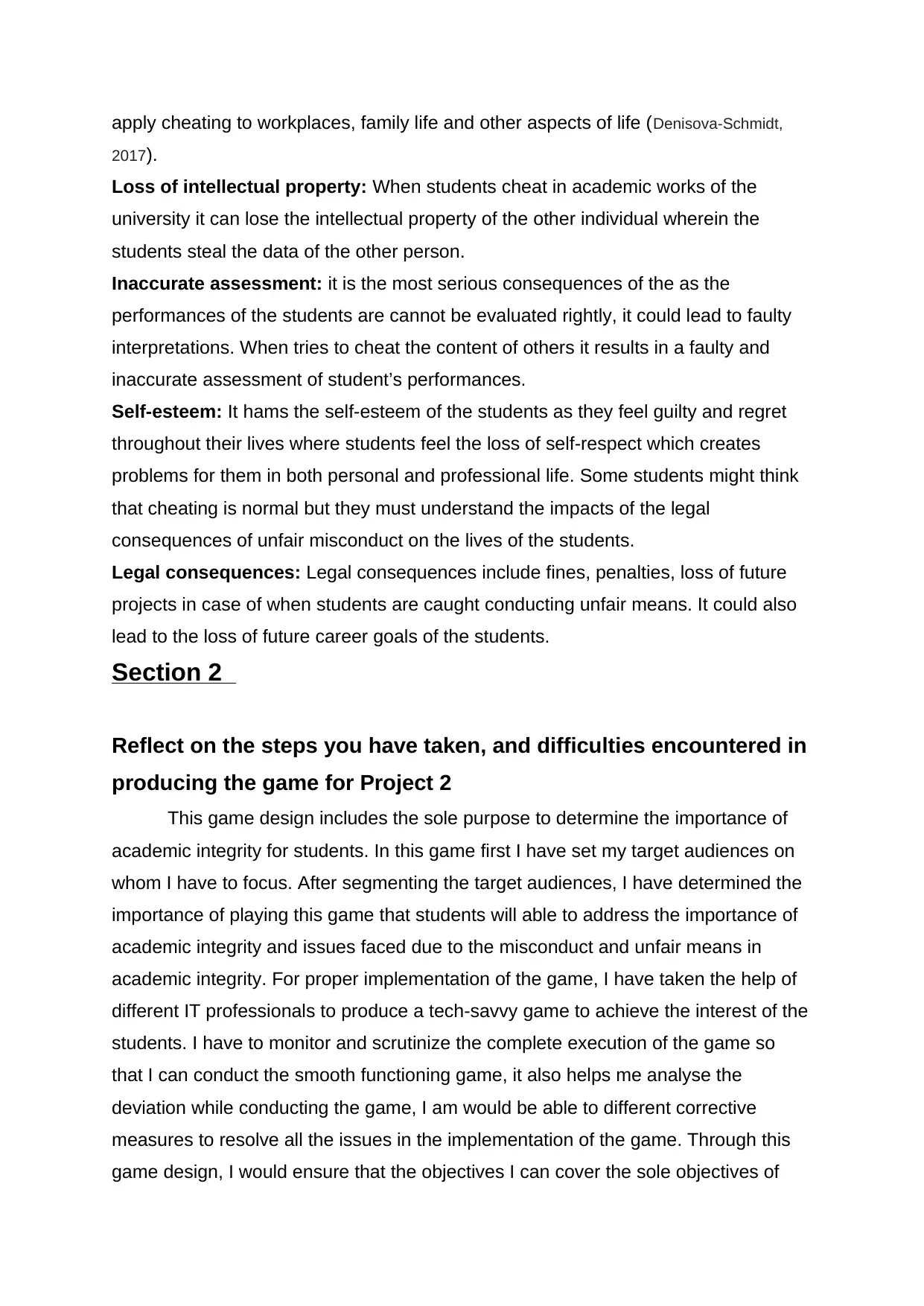
apply cheating to workplaces, family life and other aspects of life (Denisova-Schmidt,
2017).
Loss of intellectual property: When students cheat in academic works of the
university it can lose the intellectual property of the other individual wherein the
students steal the data of the other person.
Inaccurate assessment: it is the most serious consequences of the as the
performances of the students are cannot be evaluated rightly, it could lead to faulty
interpretations. When tries to cheat the content of others it results in a faulty and
inaccurate assessment of student’s performances.
Self-esteem: It hams the self-esteem of the students as they feel guilty and regret
throughout their lives where students feel the loss of self-respect which creates
problems for them in both personal and professional life. Some students might think
that cheating is normal but they must understand the impacts of the legal
consequences of unfair misconduct on the lives of the students.
Legal consequences: Legal consequences include fines, penalties, loss of future
projects in case of when students are caught conducting unfair means. It could also
lead to the loss of future career goals of the students.
Section 2
Reflect on the steps you have taken, and difficulties encountered in
producing the game for Project 2
This game design includes the sole purpose to determine the importance of
academic integrity for students. In this game first I have set my target audiences on
whom I have to focus. After segmenting the target audiences, I have determined the
importance of playing this game that students will able to address the importance of
academic integrity and issues faced due to the misconduct and unfair means in
academic integrity. For proper implementation of the game, I have taken the help of
different IT professionals to produce a tech-savvy game to achieve the interest of the
students. I have to monitor and scrutinize the complete execution of the game so
that I can conduct the smooth functioning game, it also helps me analyse the
deviation while conducting the game, I am would be able to different corrective
measures to resolve all the issues in the implementation of the game. Through this
game design, I would ensure that the objectives I can cover the sole objectives of
2017).
Loss of intellectual property: When students cheat in academic works of the
university it can lose the intellectual property of the other individual wherein the
students steal the data of the other person.
Inaccurate assessment: it is the most serious consequences of the as the
performances of the students are cannot be evaluated rightly, it could lead to faulty
interpretations. When tries to cheat the content of others it results in a faulty and
inaccurate assessment of student’s performances.
Self-esteem: It hams the self-esteem of the students as they feel guilty and regret
throughout their lives where students feel the loss of self-respect which creates
problems for them in both personal and professional life. Some students might think
that cheating is normal but they must understand the impacts of the legal
consequences of unfair misconduct on the lives of the students.
Legal consequences: Legal consequences include fines, penalties, loss of future
projects in case of when students are caught conducting unfair means. It could also
lead to the loss of future career goals of the students.
Section 2
Reflect on the steps you have taken, and difficulties encountered in
producing the game for Project 2
This game design includes the sole purpose to determine the importance of
academic integrity for students. In this game first I have set my target audiences on
whom I have to focus. After segmenting the target audiences, I have determined the
importance of playing this game that students will able to address the importance of
academic integrity and issues faced due to the misconduct and unfair means in
academic integrity. For proper implementation of the game, I have taken the help of
different IT professionals to produce a tech-savvy game to achieve the interest of the
students. I have to monitor and scrutinize the complete execution of the game so
that I can conduct the smooth functioning game, it also helps me analyse the
deviation while conducting the game, I am would be able to different corrective
measures to resolve all the issues in the implementation of the game. Through this
game design, I would ensure that the objectives I can cover the sole objectives of
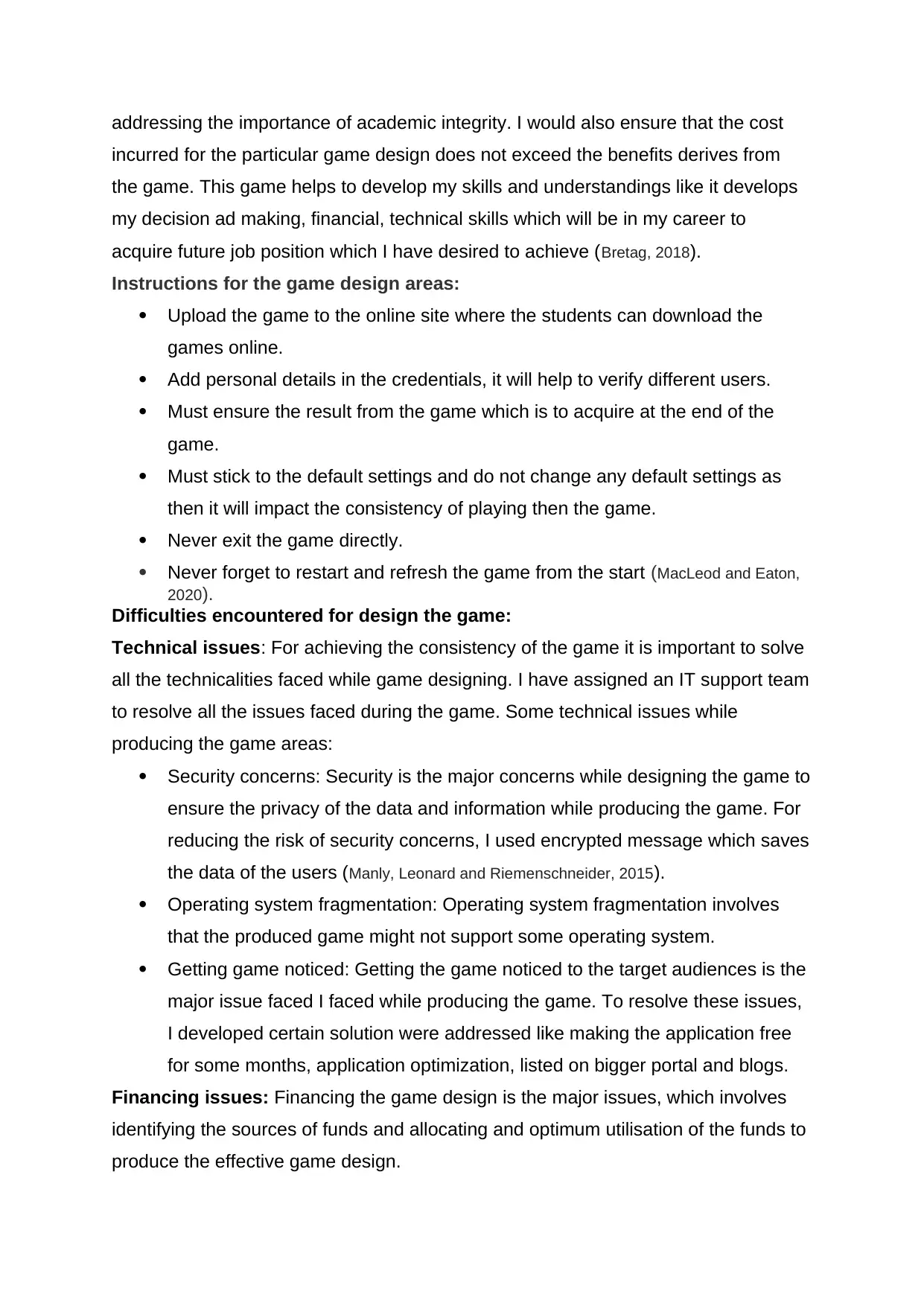
addressing the importance of academic integrity. I would also ensure that the cost
incurred for the particular game design does not exceed the benefits derives from
the game. This game helps to develop my skills and understandings like it develops
my decision ad making, financial, technical skills which will be in my career to
acquire future job position which I have desired to achieve (Bretag, 2018).
Instructions for the game design areas:
Upload the game to the online site where the students can download the
games online.
Add personal details in the credentials, it will help to verify different users.
Must ensure the result from the game which is to acquire at the end of the
game.
Must stick to the default settings and do not change any default settings as
then it will impact the consistency of playing then the game.
Never exit the game directly.
Never forget to restart and refresh the game from the start (MacLeod and Eaton,
2020).
Difficulties encountered for design the game:
Technical issues: For achieving the consistency of the game it is important to solve
all the technicalities faced while game designing. I have assigned an IT support team
to resolve all the issues faced during the game. Some technical issues while
producing the game areas:
Security concerns: Security is the major concerns while designing the game to
ensure the privacy of the data and information while producing the game. For
reducing the risk of security concerns, I used encrypted message which saves
the data of the users (Manly, Leonard and Riemenschneider, 2015).
Operating system fragmentation: Operating system fragmentation involves
that the produced game might not support some operating system.
Getting game noticed: Getting the game noticed to the target audiences is the
major issue faced I faced while producing the game. To resolve these issues,
I developed certain solution were addressed like making the application free
for some months, application optimization, listed on bigger portal and blogs.
Financing issues: Financing the game design is the major issues, which involves
identifying the sources of funds and allocating and optimum utilisation of the funds to
produce the effective game design.
incurred for the particular game design does not exceed the benefits derives from
the game. This game helps to develop my skills and understandings like it develops
my decision ad making, financial, technical skills which will be in my career to
acquire future job position which I have desired to achieve (Bretag, 2018).
Instructions for the game design areas:
Upload the game to the online site where the students can download the
games online.
Add personal details in the credentials, it will help to verify different users.
Must ensure the result from the game which is to acquire at the end of the
game.
Must stick to the default settings and do not change any default settings as
then it will impact the consistency of playing then the game.
Never exit the game directly.
Never forget to restart and refresh the game from the start (MacLeod and Eaton,
2020).
Difficulties encountered for design the game:
Technical issues: For achieving the consistency of the game it is important to solve
all the technicalities faced while game designing. I have assigned an IT support team
to resolve all the issues faced during the game. Some technical issues while
producing the game areas:
Security concerns: Security is the major concerns while designing the game to
ensure the privacy of the data and information while producing the game. For
reducing the risk of security concerns, I used encrypted message which saves
the data of the users (Manly, Leonard and Riemenschneider, 2015).
Operating system fragmentation: Operating system fragmentation involves
that the produced game might not support some operating system.
Getting game noticed: Getting the game noticed to the target audiences is the
major issue faced I faced while producing the game. To resolve these issues,
I developed certain solution were addressed like making the application free
for some months, application optimization, listed on bigger portal and blogs.
Financing issues: Financing the game design is the major issues, which involves
identifying the sources of funds and allocating and optimum utilisation of the funds to
produce the effective game design.
⊘ This is a preview!⊘
Do you want full access?
Subscribe today to unlock all pages.

Trusted by 1+ million students worldwide
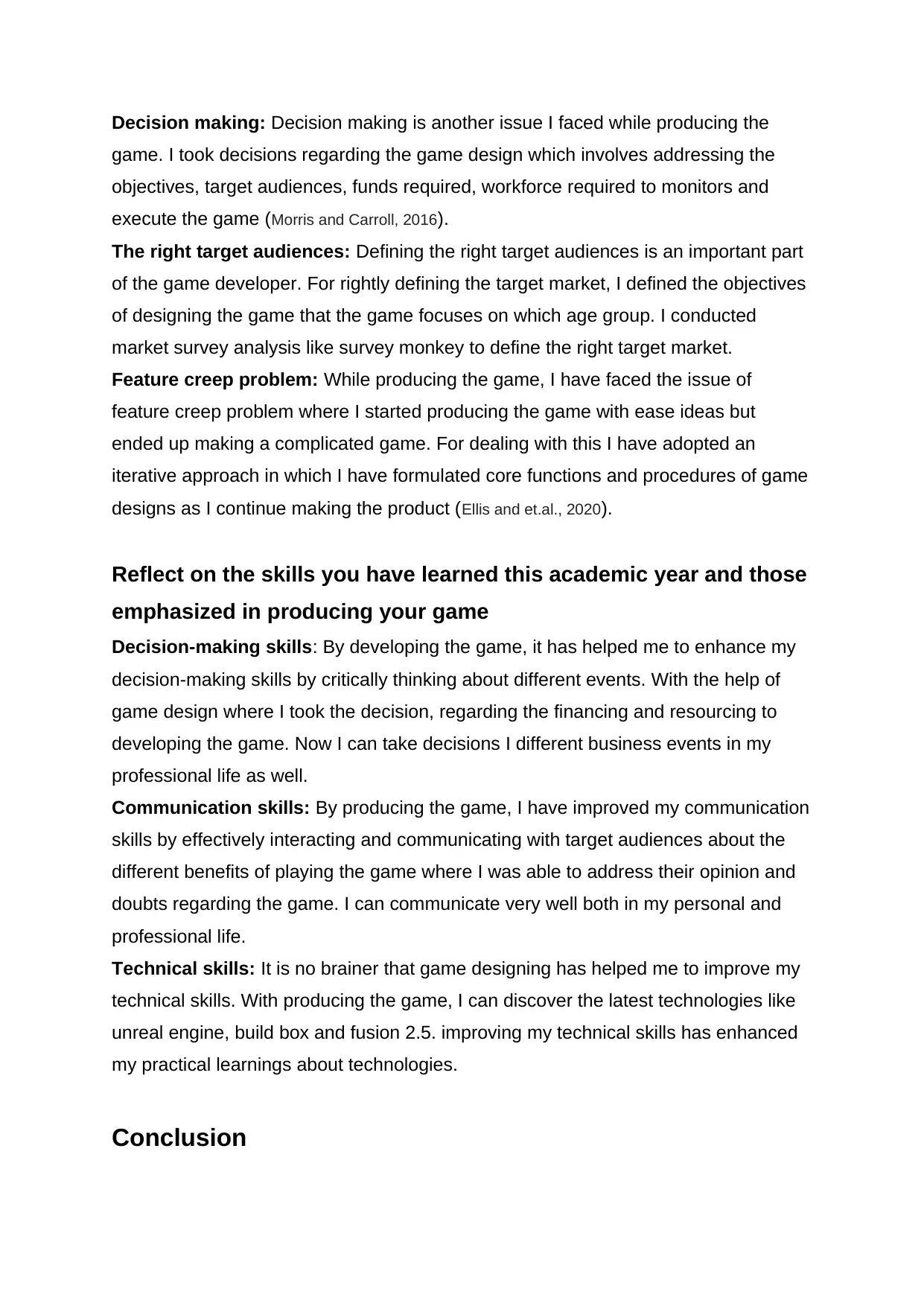
Decision making: Decision making is another issue I faced while producing the
game. I took decisions regarding the game design which involves addressing the
objectives, target audiences, funds required, workforce required to monitors and
execute the game (Morris and Carroll, 2016).
The right target audiences: Defining the right target audiences is an important part
of the game developer. For rightly defining the target market, I defined the objectives
of designing the game that the game focuses on which age group. I conducted
market survey analysis like survey monkey to define the right target market.
Feature creep problem: While producing the game, I have faced the issue of
feature creep problem where I started producing the game with ease ideas but
ended up making a complicated game. For dealing with this I have adopted an
iterative approach in which I have formulated core functions and procedures of game
designs as I continue making the product (Ellis and et.al., 2020).
Reflect on the skills you have learned this academic year and those
emphasized in producing your game
Decision-making skills: By developing the game, it has helped me to enhance my
decision-making skills by critically thinking about different events. With the help of
game design where I took the decision, regarding the financing and resourcing to
developing the game. Now I can take decisions I different business events in my
professional life as well.
Communication skills: By producing the game, I have improved my communication
skills by effectively interacting and communicating with target audiences about the
different benefits of playing the game where I was able to address their opinion and
doubts regarding the game. I can communicate very well both in my personal and
professional life.
Technical skills: It is no brainer that game designing has helped me to improve my
technical skills. With producing the game, I can discover the latest technologies like
unreal engine, build box and fusion 2.5. improving my technical skills has enhanced
my practical learnings about technologies.
Conclusion
game. I took decisions regarding the game design which involves addressing the
objectives, target audiences, funds required, workforce required to monitors and
execute the game (Morris and Carroll, 2016).
The right target audiences: Defining the right target audiences is an important part
of the game developer. For rightly defining the target market, I defined the objectives
of designing the game that the game focuses on which age group. I conducted
market survey analysis like survey monkey to define the right target market.
Feature creep problem: While producing the game, I have faced the issue of
feature creep problem where I started producing the game with ease ideas but
ended up making a complicated game. For dealing with this I have adopted an
iterative approach in which I have formulated core functions and procedures of game
designs as I continue making the product (Ellis and et.al., 2020).
Reflect on the skills you have learned this academic year and those
emphasized in producing your game
Decision-making skills: By developing the game, it has helped me to enhance my
decision-making skills by critically thinking about different events. With the help of
game design where I took the decision, regarding the financing and resourcing to
developing the game. Now I can take decisions I different business events in my
professional life as well.
Communication skills: By producing the game, I have improved my communication
skills by effectively interacting and communicating with target audiences about the
different benefits of playing the game where I was able to address their opinion and
doubts regarding the game. I can communicate very well both in my personal and
professional life.
Technical skills: It is no brainer that game designing has helped me to improve my
technical skills. With producing the game, I can discover the latest technologies like
unreal engine, build box and fusion 2.5. improving my technical skills has enhanced
my practical learnings about technologies.
Conclusion
Paraphrase This Document
Need a fresh take? Get an instant paraphrase of this document with our AI Paraphraser
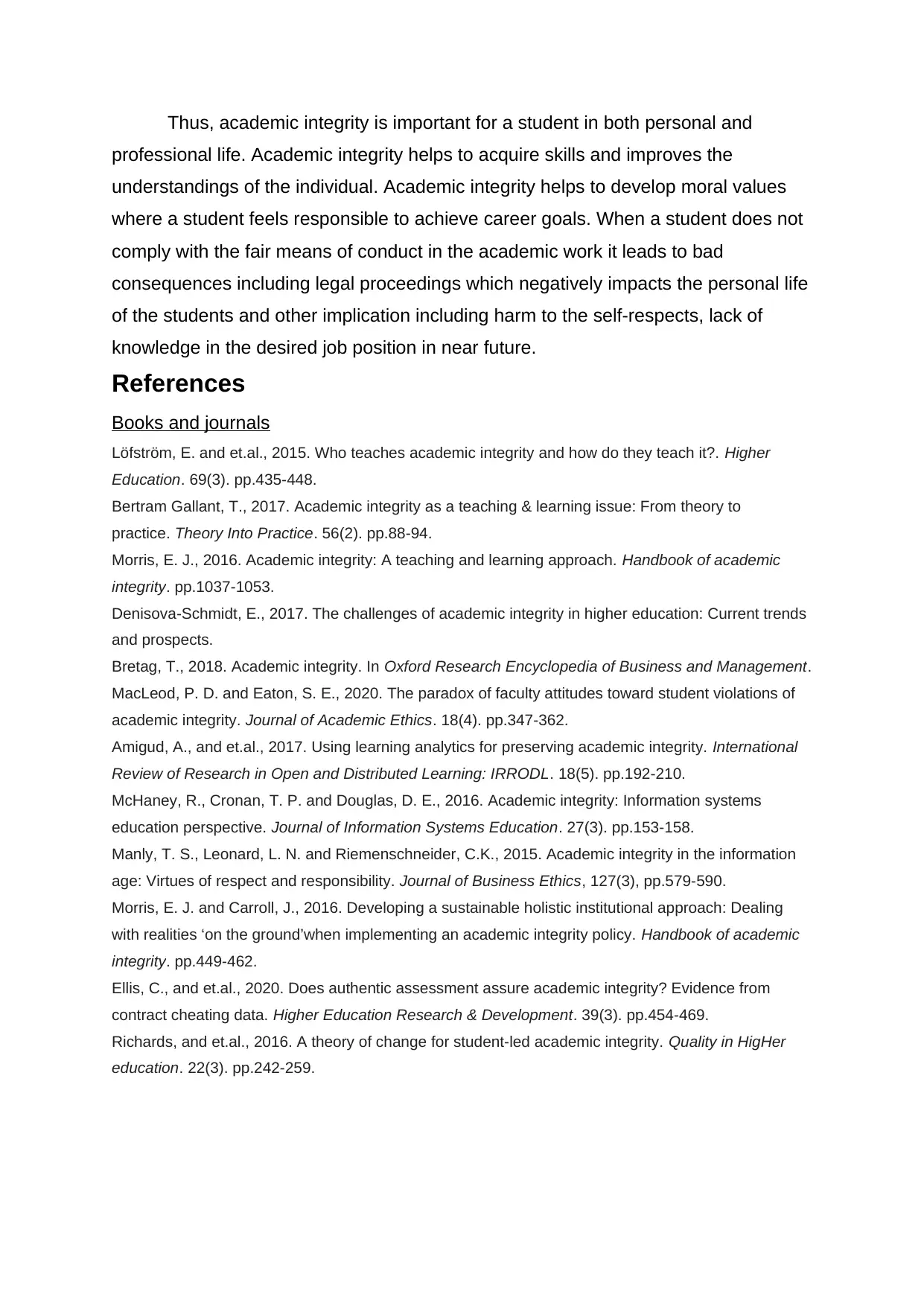
Thus, academic integrity is important for a student in both personal and
professional life. Academic integrity helps to acquire skills and improves the
understandings of the individual. Academic integrity helps to develop moral values
where a student feels responsible to achieve career goals. When a student does not
comply with the fair means of conduct in the academic work it leads to bad
consequences including legal proceedings which negatively impacts the personal life
of the students and other implication including harm to the self-respects, lack of
knowledge in the desired job position in near future.
References
Books and journals
Löfström, E. and et.al., 2015. Who teaches academic integrity and how do they teach it?. Higher
Education. 69(3). pp.435-448.
Bertram Gallant, T., 2017. Academic integrity as a teaching & learning issue: From theory to
practice. Theory Into Practice. 56(2). pp.88-94.
Morris, E. J., 2016. Academic integrity: A teaching and learning approach. Handbook of academic
integrity. pp.1037-1053.
Denisova-Schmidt, E., 2017. The challenges of academic integrity in higher education: Current trends
and prospects.
Bretag, T., 2018. Academic integrity. In Oxford Research Encyclopedia of Business and Management.
MacLeod, P. D. and Eaton, S. E., 2020. The paradox of faculty attitudes toward student violations of
academic integrity. Journal of Academic Ethics. 18(4). pp.347-362.
Amigud, A., and et.al., 2017. Using learning analytics for preserving academic integrity. International
Review of Research in Open and Distributed Learning: IRRODL. 18(5). pp.192-210.
McHaney, R., Cronan, T. P. and Douglas, D. E., 2016. Academic integrity: Information systems
education perspective. Journal of Information Systems Education. 27(3). pp.153-158.
Manly, T. S., Leonard, L. N. and Riemenschneider, C.K., 2015. Academic integrity in the information
age: Virtues of respect and responsibility. Journal of Business Ethics, 127(3), pp.579-590.
Morris, E. J. and Carroll, J., 2016. Developing a sustainable holistic institutional approach: Dealing
with realities ‘on the ground’when implementing an academic integrity policy. Handbook of academic
integrity. pp.449-462.
Ellis, C., and et.al., 2020. Does authentic assessment assure academic integrity? Evidence from
contract cheating data. Higher Education Research & Development. 39(3). pp.454-469.
Richards, and et.al., 2016. A theory of change for student-led academic integrity. Quality in HigHer
education. 22(3). pp.242-259.
professional life. Academic integrity helps to acquire skills and improves the
understandings of the individual. Academic integrity helps to develop moral values
where a student feels responsible to achieve career goals. When a student does not
comply with the fair means of conduct in the academic work it leads to bad
consequences including legal proceedings which negatively impacts the personal life
of the students and other implication including harm to the self-respects, lack of
knowledge in the desired job position in near future.
References
Books and journals
Löfström, E. and et.al., 2015. Who teaches academic integrity and how do they teach it?. Higher
Education. 69(3). pp.435-448.
Bertram Gallant, T., 2017. Academic integrity as a teaching & learning issue: From theory to
practice. Theory Into Practice. 56(2). pp.88-94.
Morris, E. J., 2016. Academic integrity: A teaching and learning approach. Handbook of academic
integrity. pp.1037-1053.
Denisova-Schmidt, E., 2017. The challenges of academic integrity in higher education: Current trends
and prospects.
Bretag, T., 2018. Academic integrity. In Oxford Research Encyclopedia of Business and Management.
MacLeod, P. D. and Eaton, S. E., 2020. The paradox of faculty attitudes toward student violations of
academic integrity. Journal of Academic Ethics. 18(4). pp.347-362.
Amigud, A., and et.al., 2017. Using learning analytics for preserving academic integrity. International
Review of Research in Open and Distributed Learning: IRRODL. 18(5). pp.192-210.
McHaney, R., Cronan, T. P. and Douglas, D. E., 2016. Academic integrity: Information systems
education perspective. Journal of Information Systems Education. 27(3). pp.153-158.
Manly, T. S., Leonard, L. N. and Riemenschneider, C.K., 2015. Academic integrity in the information
age: Virtues of respect and responsibility. Journal of Business Ethics, 127(3), pp.579-590.
Morris, E. J. and Carroll, J., 2016. Developing a sustainable holistic institutional approach: Dealing
with realities ‘on the ground’when implementing an academic integrity policy. Handbook of academic
integrity. pp.449-462.
Ellis, C., and et.al., 2020. Does authentic assessment assure academic integrity? Evidence from
contract cheating data. Higher Education Research & Development. 39(3). pp.454-469.
Richards, and et.al., 2016. A theory of change for student-led academic integrity. Quality in HigHer
education. 22(3). pp.242-259.
1 out of 8
Related Documents
Your All-in-One AI-Powered Toolkit for Academic Success.
+13062052269
info@desklib.com
Available 24*7 on WhatsApp / Email
![[object Object]](/_next/static/media/star-bottom.7253800d.svg)
Unlock your academic potential
Copyright © 2020–2026 A2Z Services. All Rights Reserved. Developed and managed by ZUCOL.




